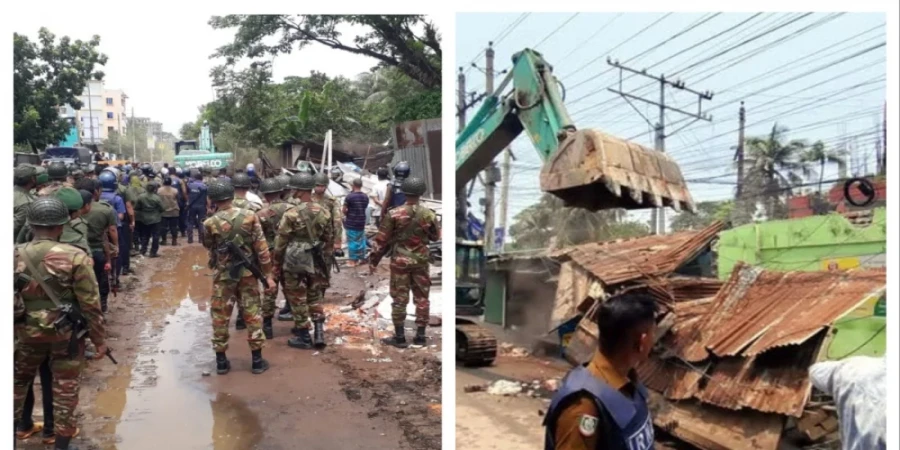
ছবি: Photo: Collected
Authorities have launched a major eviction drive to remove illegal structures from railway land in Mymensingh city. On Wednesday, May 14, the Bangladesh Railway, in collaboration with the district administration and joint forces, began demolishing unauthorized establishments that had been constructed along both sides of the railway track in the Sankipara market area.
The operation commenced around 10:00 AM and led to the demolition of over 300 makeshift shops that had been unlawfully built on railway-owned land. The area had been occupied for years, with informal businesses taking root under what officials described as arrangements made through unofficial channels.
Prior to the operation, authorities used loudspeakers to notify shopkeepers and local vendors to remove their goods and vacate the area voluntarily. The announcement was intended to minimize damage to property and avoid confrontation during the eviction process. Despite the warning, many shopkeepers expressed frustration over the loss of their businesses but complied with the order.
Officials from the Bangladesh Railway stated that the primary objective of the drive is to reclaim government property and ensure the safety of train operations in the area. They emphasized that the growing encroachment had posed risks to railway infrastructure and obstructed regular maintenance and movement of trains.
The eviction drive was led by Executive Magistrate Md. Shafiqul Islam from the Mymensingh Deputy Commissioner’s office and Nasir Uddin Mahmud, Divisional Estate Officer and Deputy Secretary of the Railway's property division. Both officials were present at the site and supervised the clearance operation alongside members of the law enforcement agencies.
Speaking on behalf of the railway authority, Nasir Uddin Mahmud explained that the operation was conducted in accordance with directives from the Ministry of Railways. He noted that powerful individuals had taken control of railway land over decades, later renting it out informally to small traders in exchange for large sums of money. These arrangements, he said, were entirely illegal and deprived the railway of its rightful assets.
He further added that following the clearance, the government would assess whether the land could be lawfully leased to legitimate business owners under regulated terms. However, any decision in this regard would be taken at a later stage, only after reviewing policy considerations and ensuring compliance with legal procedures.
Mahmud stressed that this initiative is part of a broader, countrywide effort to recover railway land from illegal occupation. Similar operations are underway or planned in other districts as part of the railway authority’s campaign to protect vital infrastructure and uphold the rule of law.
Locals observed a heavy presence of police and other security personnel at the site to maintain order and prevent any resistance during the demolition. While there were no reports of major clashes, several business owners voiced concerns over the loss of their livelihoods. Some claimed they had been paying rent for years to individuals who presented themselves as authorized leaseholders.
The railway authority acknowledged these concerns but maintained that all such arrangements were informal and illegal. Officials reiterated their commitment to restoring government land and promised transparency in any future leasing decisions.
The demolition of structures in Sankipara marks a significant moment in the ongoing effort to free up public land encroached upon across the country. The authorities affirmed their resolve to continue the operation in other areas as necessary, asserting that illegal occupation of state property would no longer be tolerated.
As the day-long operation came to an end, the previously crowded market area stood empty, with debris scattered across the former shop locations. Clean-up crews were seen clearing the remnants of the demolished structures, and signs were posted to prevent further occupation of the land.
No announcement was made regarding immediate relocation or rehabilitation plans for the affected traders. However, district officials hinted that if any resettlement plan is initiated in the future, it would follow legal procedures and prioritize those who had previously operated on the land under genuine business needs.
The eviction drive reflects a renewed commitment from the Bangladesh Railway to reassert control over its assets and improve operational safety, especially in densely populated urban zones.
repoter






